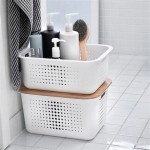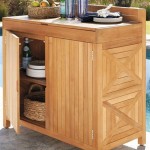The Ultimate Fruit Storage Basket Guidelines
Investing in a high-quality fruit storage basket is essential for preserving the freshness and longevity of your produce. With the right storage conditions, you can enjoy delicious and nutritious fruits for longer. Here are the ultimate guidelines to help you choose and maintain the perfect fruit storage basket:
Choose the Right Material
Fruit storage baskets come in various materials, each with its advantages and disadvantages. Natural materials like wicker and bamboo offer breathability, allowing air to circulate and prevent moisture build-up. Plastic baskets are durable, easy to clean, and often more affordable. Consider your storage needs and preferences when making your choice.
Consider the Size and Shape
The size of the basket depends on the quantity of fruit you typically store. A larger basket may accommodate multiple types of fruits, while a smaller one is suitable for smaller households or specific fruits, such as avocados or bananas. Choose a basket with a shape that fits your storage space, whether it's a countertop, pantry shelf, or refrigerator.
Ensure Adequate Ventilation
Proper ventilation is crucial for preventing fruit spoilage. Look for baskets with open or mesh designs that allow air to circulate freely. Avoid using closed containers, as they trap moisture and create an ideal environment for spoilage.
Control Temperature and Humidity
Different fruits have specific temperature and humidity requirements for optimal storage. Most fruits prefer cool, humid environments. For example, bananas should be stored at room temperature, while berries and grapes thrive in the refrigerator's crisper drawer. Adjust the storage location and basket design to meet the needs of your specific fruits.
Separate Incompatible Fruits
Certain fruits, such as apples and avocados, produce ethylene gas, which can accelerate the ripening process of other fruits. To prevent premature spoilage, store these fruits separately from ethylene-sensitive fruits like bananas, berries, and melons.
Monitor Regularly
Even with the best storage conditions, fruits can deteriorate over time. Regularly inspect your fruit for signs of spoilage, such as bruising, mold, or discoloration. Remove any spoiled fruit promptly to prevent its spread and preserve the freshness of the remaining produce.
Additional Tips
To further enhance fruit storage, consider these additional tips:
- Line the basket with a moisture-absorbing material, such as newspaper or paper towels, to prevent moisture buildup.
- Avoid overloading the basket, as it can restrict air circulation and promote spoilage.
- Store fruits in a place protected from direct sunlight, which can damage or ripen them prematurely.
- For long-term storage, consider using a fruit-specific ripening agent, such as an apple or banana, to promote even ripening.
By following these guidelines, you can create the optimal fruit storage environment and enjoy fresh, delicious, and nutritious fruits for longer.

10 Best Fruit Storage Ideas Of 2024 Basket Containers And More

10 Best Fruit Storage Ideas Of 2024 Basket Containers And More

10 Best Fruit Storage Ideas Of 2024 Basket Containers And More

10 Best Fruit Storage Ideas Of 2024 Basket Containers And More

10 Best Fruit Storage Ideas Of 2024 Basket Containers And More
Produce Storage Guide How To Keep Fruits Vegetables Fresh

The Best Ways To Produce Without Refrigeration Epicurious

Guide To Organize Kitchen Baskets In Modern Modular Decorpot

Fruits And Vegetables You Should Never Together Unless Want Them To Spoil Faster

The Ultimate Home Apple Storage Guide For Freshness And Flavor Longevity Everyday Skate
Related Posts








